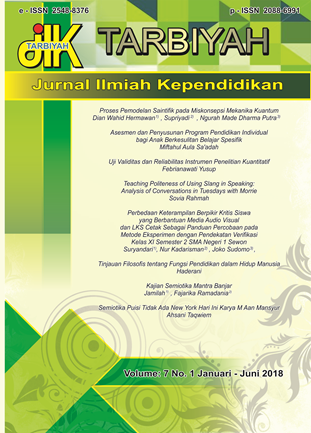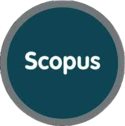Teaching Politeness of Using Slang in Speaking: Analysis of Conversations in Tuesdays with Morrie
DOI:
https://doi.org/10.18592/tarbiyah.v7i1.2102Abstract
Slang language is commonly used in American society in their daily life communication. However, teachers are still hesitant to teach slang in their speaking class, because slang language is assumed as impolite language. Most of the teachers don’t realize that even slang language can be used in polite conversation. This paper is intended to show some analysis on some conversations in the movie entitle ‘Tuesdays with Morrie’ which are assumed as the representation of social language for American. The focus of the analysis is the use of slang in polite conversations. The analysis will be based on the identification of a communicative event along with three dimensions called field, tenor, and mode. The significance of the study is to clarify teachers’ understanding toward slang language that can be assumed as a politeness, so the teachers will not hesitate to teach slang language to their students in speaking class. Furthermore, through this analysis, the students will know why, when, where, and how to use slang politely in their daily life conversation.References
Okabe, R. 1990. Unwillingness to discard tradition: Politeness. In G. Furuta (Ed.), Keywords in intercultural communication (pp. 132-3). Tokyo: Yuhikaku.
Janney, R. W., & Arndt, H. 1992 . Intracultural tact versus intercultural tact. In R. J. Watts, S. Ide, & K. Ehlich (Eds.), Politeness in language: Studies in its history, theory and practice. Berlin: Mouton de Gruyter.
Stockwell, P. 2007. Sociolinguistics: A Resource Book for Students, 2nd Edition. New York: Routledge.
Brown,P., & Levinson, S. 1987. Politeness. Cambridge: Cambridge University Press.
Ting-Toomey, S. 1994. Face and facework: An introduction. In S. Ting-Toomey (Ed.), The challenge of facework (pp. 1-14). Albany: State University of New York Press.
Yule, G. 1996. The Study of Language. Cambridge: Cambridge University Press.
Huang, Y. 2008. Politeness Principle in Cross-Culture Communication. English Language Teaching, 1(1).
Leech, G. 1983. Principles of Pragmatics. New York: Longman.
Finegan, E. 2004. Language: Its Structure and Use, 4th Ed. Boston: Wadsworth.
O’Grady, W., & Archibald, J. 2004. Contemporary Linguistic Analysis: an Introduction. Toronto: Pearson Education Canada.
Hayakawa, S.I. 1941. Language in Action. New York: Hardcourt Brace and Co.
Anderson, L., & Trudgill, P. 1990. Bad Language. Cambridge: Basil Blackwell.
Zhou, M. Y. Q. 2005. A McMAster Undergraduate Study of the Social Origins and Implications of Slang and Gendered Language. The McMaster Journal of Communication, 2(6) pp. 52-74.
Mazer, J.P., & Hunt, S.K. 2008. The Effects of Instructor Use of Positive and Negative Slang on Student Motivation, Affective Learning, and Classroom Climate. Communication Research Reports, 25(1), pp. 44-45.
Mazer, J. P. 2006. Cool communication in the classroom: Instructor use of positive slang and its effects on student motivation, affective learning, and perceptions of teacher credibility. Unpublished master’s thesis, Illinois State University, Normal, Ill.
Rothwell, J. D. 1971. Verbal obscenity: Time for second thoughts.Western Speech, 35, 231–242
Homuth, K.J., & Piippo, A. 2011, October. Slang in the ESL Classroom. Paper presented at Michigan Teachers of English to Speakers of Other Languages Conference, Kalamazoo, Michigan. Retrieved from: http//www. emich.edu
Burke, D. 1998. Without Slang and Idioms, Students are in the Dark. Retrieved from: http://ingles.ing.uchile.cl.
Ogawa, N., & Gudykunst, W.B. 2000. Politeness Rules in Japan and United States. Intercultural Communication Studies, 9(1). pp 47-69.
Kipfer, B.A., & Chapman, R.L. 2007. Dictionary of American Slang. New York: Collins.
Downloads
Published
How to Cite
Issue
Section
License
Authors retain copyright and grant the journal right of first publication with the work simultaneously licensed under a Creative Commons Attribution 4.0 International License that allows others to share the work with an acknowledgment of the work's authorship and initial publication in this journal.




